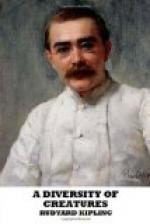’Forsyth Sahib had said, “Let the flowers be sent to Wanidza with the other flowers which all the world is sending.” But they said among themselves, “It is not fit that these flowers, which are the offerings of His Armies in Hind, should come to the Palace of the Presence by the hands of hirelings or messengers, or of any man not in His service.”
’Hearing this, Forsyth Sahib, though he was much occupied with office-work, said, “Give me the flowers, and I will steal a time and myself take them to Wanidza.”
’The eldest said, “Since when has Forsyth Sahib worn sword?”
’Forsyth Sahib said, “But always. And I wear it in the Presence when I put on uniform. I am a Colonel in the Armies of Hind.” The eldest said, “Of what regiment?” And Forsyth Sahib looked on the carpet and pulled the hair of his lip. He saw the trap.’
’Forsyth Sahib’s regiment was once the old Forty-sixth Pathans which was called—’ the Subadar-Major gave the almost forgotten title, adding that he had met them in such and such campaigns, when Forsyth Sahib was a young captain.
The Havildar-Major took up the tale, saying, ’The eldest knew that also, my father. He laughed, and presently Forsyth Sahib laughed.
’"It is true,” said Forsyth Sahib. “I have no regiment. For twenty years I have been a clerk tied to a thick pen. Therefore I am the more fit to be your orderly and messenger in this business.”
’The eldest then said, “If it were a matter of my life or the honour of any of my household, it would be easy.” And Forsyth Sahib joined his hands together, half laughing, though he was ready to weep, and he said, “Enough! I ask pardon. Which one of you goes with the offering?”
’The eldest said, feigning not to have heard, “Nor must they be delivered by a single sword—as though we were pressed for men in His service,” and they saluted and went out.’
‘Were these things seen, or were they told thee?’ said the Subadar-Major.
’I both saw and heard in the office full of books and papers where my Colonel Sahib consulted Forsyth Sahib upon the business that had brought my Colonel Sahib to England.’
‘And what was that business?’ the Regimental Chaplain asked of a sudden, looking full at the Havildar-Major, who returned the look without a quiver.
‘That was not revealed to me,’ said the Havildar-Major.
’I heard it might have been some matter touching the integrity of certain regiments,’ the Chaplain insisted.
‘The matter was not in any way open to my ears,’ said the Havildar-Major.
‘Humph!’ The Chaplain drew his hard road-worn feet under his robe. ’Let us hear the tale that it is permitted thee to tell,’ he said, and the Havildar-Major went on:
’So then the three, having returned to the Temple, called the fourth, who had only forty-five years, when he came off guard, and said, “We go to the Palace at Wanidza with the offerings. Remain thou in the Presence, and take all our guards, one after the other, till we return.”




